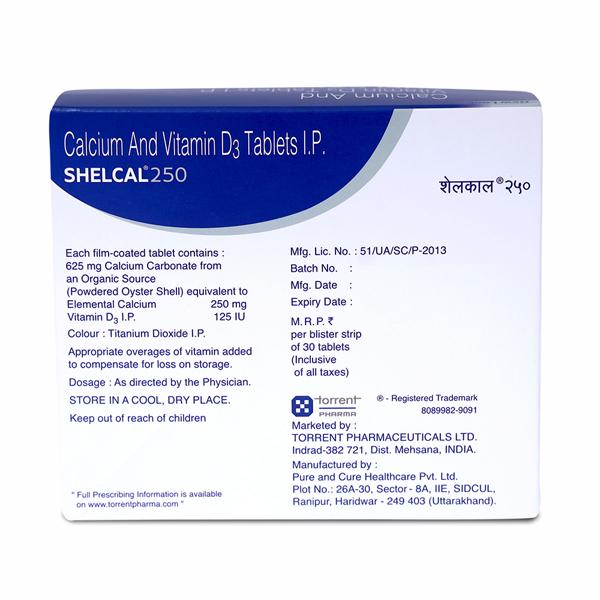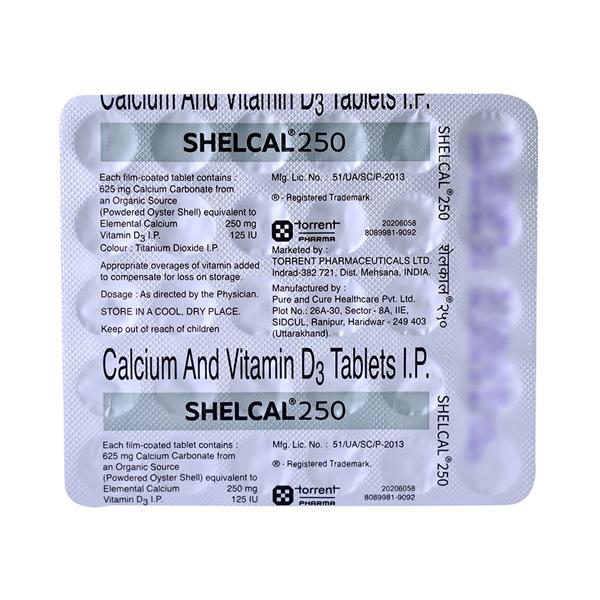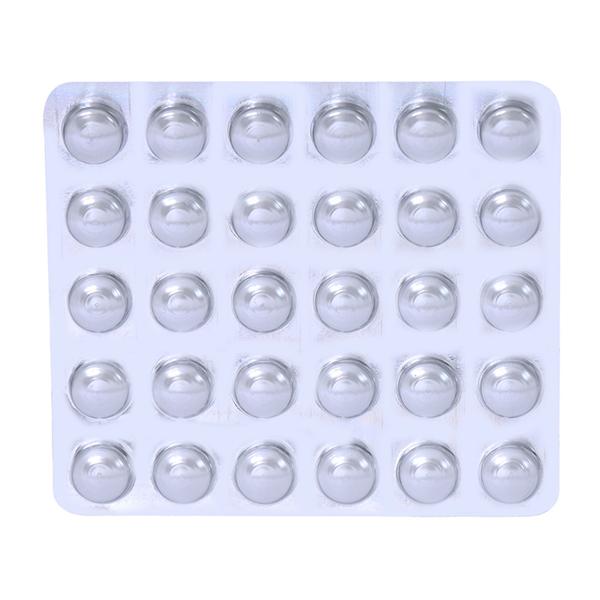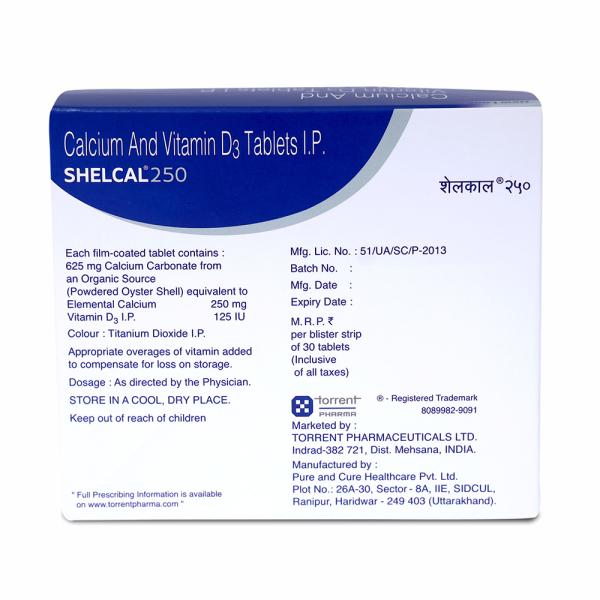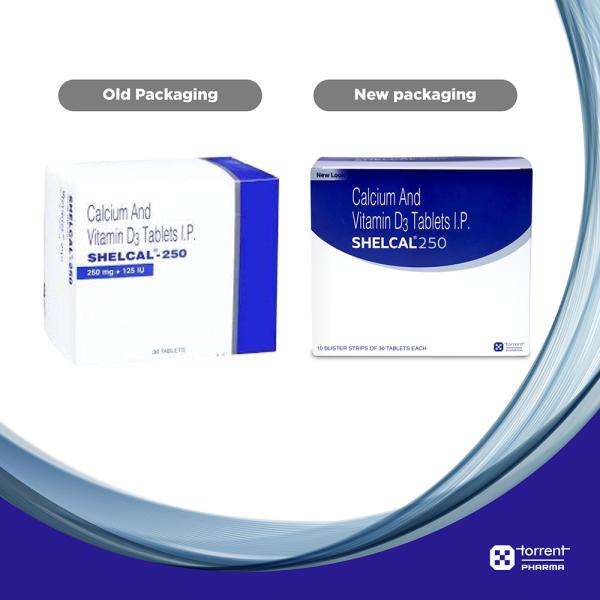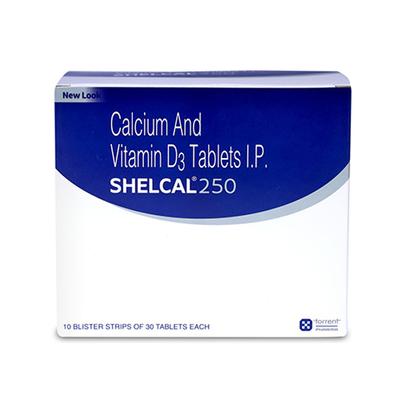

Netmeds First Membership
Quick Links
Introduction About SHELCAL 250MG TABLET
SHELCAL 250MG TABLET contains Calcium Carbonate, Cholecalciferol (Vitamin D3) and Elemental Calcium which belong to the group of medicines called Calcium and Vitamin D3 Supplements. It is used for the management of calcium and vitamin D3 deficiency.
SHELCAL 250MG TABLET is not recommended for use in patients suffering from Hypervitaminosis D, severe kidney disorder, kidney failure, nephrolithiasis/nephrocalcinosis (kidney stones), diseases which cause hypercalcaemia (high calcium levels in the blood) and hypercalciuria (high calcium in the urine) such as myeloma, bone metastases, primary hyperparathyroidism, rare hereditary problems of fructose intolerance, glucose-galactose malabsorption or sucrase-isomaltase insufficiency.
SHELCAL 250MG TABLET should be used with caution in patients suffering from kidney disease or reduced kidney function or who are prone to the development of kidney stones, sarcoidosis (an inflammatory disease affecting multiple organs), or immobilised patients with a risk of osteoporosis.
SHELCAL 250MG TABLET may be used during pregnancy in cases of calcium and vitamin D3 deficiency. SHELCAL 250MG TABLET can be used by breastfeeding women. In elderly patients suffering from systemic disorders, SHELCAL 250MG TABLET should be used with caution. Consult your doctor immediately if you experience any side effects after taking SHELCAL 250MG TABLET.
Uses Of SHELCAL 250MG TABLET
- SHELCAL 250MG TABLET is used for management of calcium and vitamin D3 deficiency
How SHELCAL 250MG TABLET Works
SHELCAL 250MG TABLET contains Calcium Carbonate, Elemental calcium, and Cholecalciferol (Vitamin D3). Calcium carbonate provides calcium ions in the blood to manage negative calcium balance and increase serum calcium levels. Cholecalciferol (Vitamin D3) is important for the intestinal absorption of calcium.
How to use SHELCAL 250MG TABLET
Take SHELCAL 250MG TABLET as advised by your physician. Swallow the medicine as a whole with a glass of water. Do not crush or chew the medicine. Your doctor will decide the exact dose and duration of management for you depending upon your age, body weight and disease condition.
Side Effects Of SHELCAL 250MG TABLET
Uncommon
- hypercalcaemia (increased calcium levels in the blood)
- hypercalciuria (high calcium levels in urine)
Rare
- constipation, flatulence (gas)
- nausea, abdominal pain, diarrhoea
- pruritis, rashes and urticaria
How To Manage Side Effects
Diarrhea
Drink plenty of water or fruit juices to stay hydrated. Take no medication on your own to manage diarrhoea. If your diarrhoea worsens, see your doctor.
Nausea And Vomiting
Take the medicine with, or just after, meals. Stick to simple meals. Avoid eating oily, rich, or spicy food. Contact your doctor if your nausea worsens.
Stomach Pain
Try to rest and relax. Consume small meals regularly. Keep a heating pad on your stomach; however, contact your doctor if the stomach pain does not improve.
Warning & Precautions
Pregnancy
Consult your doctorSHELCAL 250MG TABLET may be used during pregnancy in cases of calcium and vitamin D3 deficiency. Consult your doctor before taking it.
Breastfeeding
Consult your doctorSHELCAL 250MG TABLET can be used during breastfeeding. As calcium and vitamin D can pass into breast milk, this should be considered when giving additional vitamin D to the child.
Kidney
Consult your doctorSHELCAL 250MG TABLET is not recommended for use in patients suffering from a severe kidney disorder, kidney failure, nephrolithiasis/nephrocalcinosis (kidney stones) and it should be used with caution in patients with kidney disease or reduced kidney function or prone to development of kidney stone. Consult your doctor before taking it.
Allergy
ContraindicatedDo not take SHELCAL 250MG TABLET if you are allergic to Calcium carbonate, Vitamin D3 and elemental calcium or soya or peanut, sucrose or any other ingredients of this medicine.
Use In Geriatrics
Use with CautionSHELCAL 250MG TABLET should be with caution in elderly patients above 65 years. Consult your doctor before taking it.
Others
SHELCAL 250MG TABLET is not recommended for use if you have:
- hypervitaminosis d (excess amount of vitamin d in the blood)
- diseases which cause hypercalcaemia (high calcium levels in the blood) and hypercalciuria (high calcium in the urine) such as myeloma, bone metastases, primary hyperparathyroidism
- rare hereditary problems of fructose intolerance, glucose-galactose malabsorption or sucrase-isomaltase insufficiency
Before taking SHELCAL 250MG TABLET inform your doctor if you have:
- sarcoidosis (an inflammatory condition which affects multiple organs)
- are immobilised due to osteoporosis
Interactions
A. Drug-Drug interactions:
Before taking SHELCAL 250MG TABLET, inform your doctor if you are taking any of the following medicine:
- thiazide diuretics such as chlorthalidone, chlorothiazide, and hydrochlorothiazide (medicines used for the management of kidney disorders and high blood pressure)
- systemic corticosteroids such as hydrocortisone, methylprednisolone, and dexamethasone (medicines used for the management of various inflammatory conditions)
- cholestyramine (a medicine used for the management of high cholesterol)
- paraffin oil (a medicine used for the management of constipation)
- tetracycline (a medicine used for the management of bacterial infections)
- cardiac glycosides such as acetyldigitoxin, and digoxin (medicines used for the management of cardiac arrhythmias)
- bisphosphonates ex. zoledronic acid (medicines used for cancer management)
- rifampicin (a medicine used for the management of tuberculosis)
- barbiturates such as phenobarbital, primidone, and phenytoin (medicines used for the management of seizures)
- quinolones such as ciprofloxacin, enoxacin, and gemifloxacin (medicines used for the management of bacterial infections)
- sodium fluoride (used to manage dental caries)
- iron, zinc, and strontium-containing medicines
- estramustine (a medicine used for the management of cancer)
- thyroid hormone preparations such as levothyroxine (medicines used for the management of hypothyroidism)
B. Drug-food interaction:
- food containing oxalic acid such as spinach, sorrel, rhubarb
- food containing phytic acid such as whole wheat cereals
Overdosage:
If you or anybody else accidentally take too much of SHELCAL 250MG TABLET then consult your doctor immediately or visit the nearby hospital. Symptoms of overdosage of SHELCAL 250MG TABLET can lead to hypervitaminosis and hypercalcaemia. Symptoms of hypercalcaemia may include anorexia, thirst, nausea, vomiting, constipation, abdominal pain, muscle weakness, fatigue, mental disturbances, polyuria (frequent urination), bone pain, nephrocalcinosis, renal stones and in severe cases, cardiac arrhythmias (irregular heartbeat). Extreme high doses of calcium may lead to coma and death.
Synopsis
| Drug | : | Calcium Carbonate, Cholecalciferol (Vitamin D3), Elemental Calcium |
| Pharmacological Category | : | Calcium and Vitamin D3 supplements |
| Therapeutic Indication | : | Calcium and Vitamin D Deficiency |
| Dosage Forms | : | Tablet |
More Information
- Keep SHELCAL 250MG TABLET out of reach from children
- Store SHELCAL 250MG TABLET in a cool and dry place
FAQs About SHELCAL 250MG TABLET
Q: Is SHELCAL 250MG TABLET safe in pregnancy?
A: SHELCAL 250MG TABLET may be used during pregnancy in cases of calcium and vitamin D3 deficiency. Consult your doctor before taking it.
Q: What is SHELCAL 250MG TABLET used for?
A: SHELCAL 250MG TABLET is used for the management of calcium and vitamin D3 deficiency. Consult your doctor before taking it.
Q: What happens if I take too much of SHELCAL 250MG TABLET?
A: In case you or anybody else accidentally take too much of SHELCAL 250MG TABLET then consult your doctor immediately or visit the nearby hospital. Symptoms of overdosage of SHELCAL 250MG TABLET can lead to hypervitaminosis and hypercalcaemia. Symptoms of hypercalcaemia may include anorexia, thirst, nausea, vomiting, constipation, abdominal pain, muscle weakness, fatigue, mental disturbances, polyuria (frequent urination), bone pain, nephrocalcinosis, renal stones and in severe cases, cardiac arrhythmias (irregular heartbeat). Extreme high doses of calcium may lead to coma and death.
Q: What foods I should avoid eating with SHELCAL 250MG TABLET?
A: Food containing oxalic acids such as spinach, sorrel, rhubarb, and food containing phytic acid such as whole wheat cereals should not be taken within 2 hours of taking SHELCAL 250MG TABLET.
Q: Is SHELCAL 250MG TABLET safe for use in kidney patients?
A: No, SHELCAL 250MG TABLET is not recommended for use in patients suffering from a severe kidney disorder, kidney failure, or nephrolithiasis/nephrocalcinosis (kidney stones). And it should be used with caution in patients with kidney disease or reduced kidney function or prone to A: development of kidney stones.
Q: What are other good sources of vitamin D3 and calcium?
A: Some of the good sources of vitamin D3 and calcium are cod liver oil, egg yolks, cheese, milk, tofu, kale, broccoli, yoghurt etc.
References
1. KD Tripathi. Hormones and related Drugs. Essentials of Medical Pharmacology, 7th edition 2013. page 340.
2. Kristina Fritz, Kathrine Taylor, Mayur Parmar. Calcium Carbonate. National Centre for Biotechnology. NLM. National Institute of Health. Statpearls. July 2022. [Accessed on 29th September 2022] https://www.ncbi.nlm.nih.gov/books/NBK562303/#article-31520.s3
3. Krati Chauhan, Mahsa Shahrokhi, Martin R. Huecker. Vitamin D. National Centre for Biotechnology. NLM. National Institute of Health. Statpearls. July 2022. [Accessed on 29th September 2022] https://www.ncbi.nlm.nih.gov/books/NBK441912/
4. Torrent pharmaceuticals. Shelcal 250 (Calcium Carbonate + Cholecalciferol + Elemental Calcium). [Revised in May 2022] [Accessed on 29th September 2022] https://www.torrentian.com/pisheet/Upload/PI_Sheet/2623.pdf
Useful Diagnostic Tests
- serum calcium levels, phosphate levels, urinary calcium levels
- renal function tests
- Serum (25-hydroxyvitamin D)











